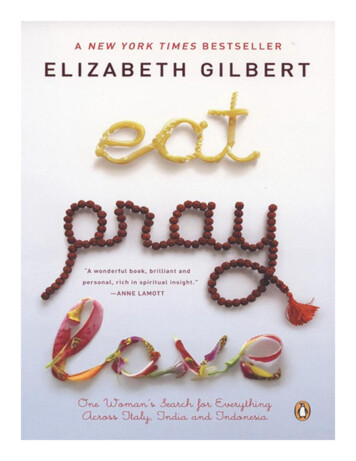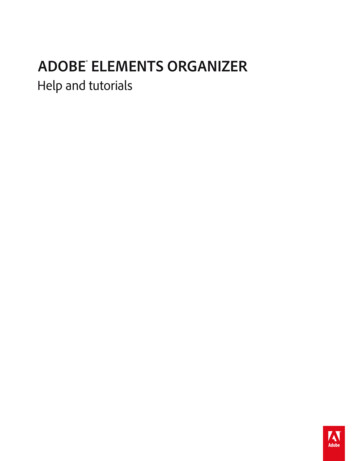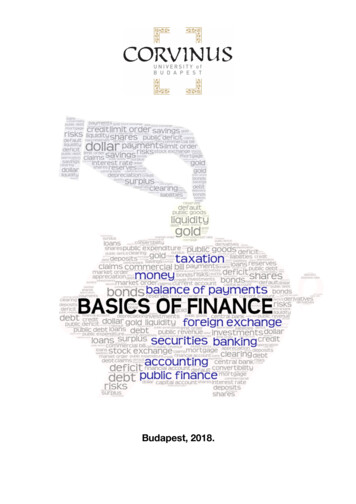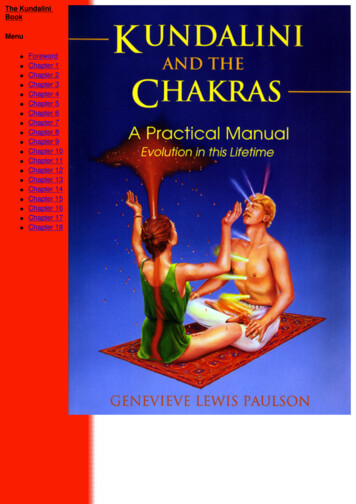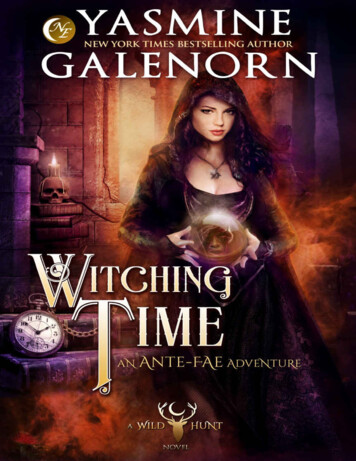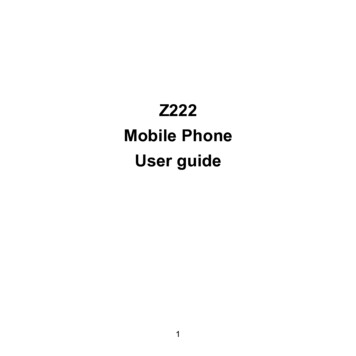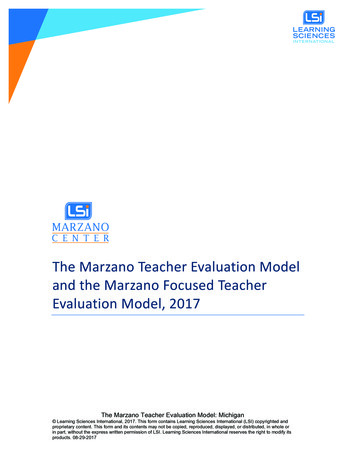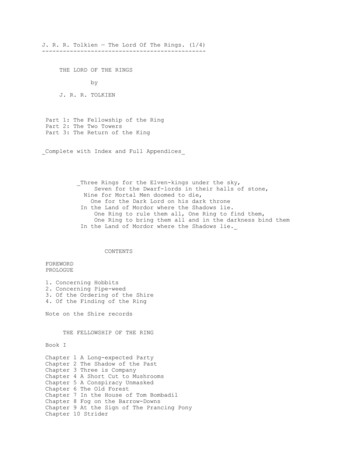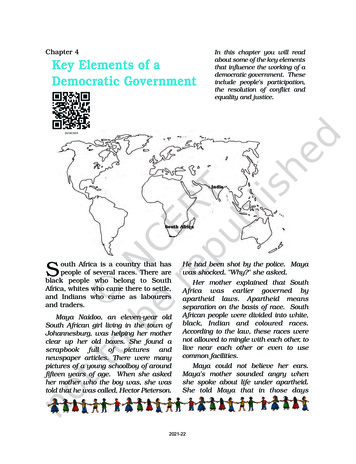
Transcription
Chapter 4Key Elements of aDemocratic GovernmentIn this chapter you will readabout some of the key elementsthat influence the working of ademocratic government. Theseinclude people's participation,the resolution of conflict andequality and justice.IndiaSouth Africaouth Africa is a country that haspeople of several races. There areblack people who belong to SouthAfrica, whites who came there to settle,and Indians who came as labourersand traders.SMaya Naidoo, an eleven-year oldSouth African girl living in the town ofJohannesburg, was helping her motherclear up her old boxes. She found ascrapbook full of pictures andnewspaper articles. There were manypictures of a young schoolboy of aroundfifteen years of age. When she askedher mother who the boy was, she wastold that he was called, Hector Pieterson.He had been shot by the police. Mayawas shocked. "Why?" she asked.Her mother explained that SouthAfrica was earlier governed byapartheid laws. Apartheid meansseparation on the basis of race. SouthAfrican people were divided into white,black, Indian and coloured races.According to the law, these races werenot allowed to mingle with each other, tolive near each other or even to usecommon facilities.Maya could not believe her ears.Maya's mother sounded angry whenshe spoke about life under apartheid.She told Maya that in those days2021-22
36 / Social and Political Lifewhites spoke. Hector and other schoolstudents were being forced to learnthis language but they wanted to learntheir own language, Zulu. The SouthAfrican police beat up the protestorsmercilessly and shot at the crowd.One of their bullets killed Hector. Thiswas on 16 June 1976.The African National Congress, agroup of people who led the struggleagainst apartheid, and their most wellknown leader, Nelson Mandela foughtthe apartheid system for severalyears. Finally, they succeeded and in1994 South Africa became ademocratic country in which people ofall races were considered equal.hospitals were separate and so wereambulances. An ambulance meant forwhite people would always be wellequipped while one meant for blackpeople was not. There were separatetrains and buses. Even the busstopswere different for black and whitepeople.Non-whites were not allowed tovote. The best land in the country wasreserved for the white people, and nonwhites had to live on the worstavailable land. Thus blacks andcoloured people were not considered tobe equal to whites.One black township was the SouthWestern Township (Soweto). HectorPieterson lived here and he and hisclassmates joined the protest againstlearning the Afrikaans language inschool. This was the language that theWhat were Hector and his classmatesprotesting about?List five ways in which the non-whiteswere discriminated against:1.2.3.4.5.Do you think it is important for allpersons to be treated equally? Why?Let us now try to understand whata democratic government means to allof us.PARTICIPATIONWhy do we have regular elections?You've already read in the previouschapter that people make thedecisions in a democracy. Throughvoting in elections people elect leadersto represent them. These representatives take decisions on behalf of the2021-22
Key Elements of a Democratic Governmentpeople. In doing so it is assumed thatthey will keep in mind the voices andinterests of the people.DiscussLook at some newspapers anddiscuss some elections that youmay have read about. Why doyou think elections are requiredafter a fixed period?All governments are elected for fixedperiods. In India this period is five years.Once elected, governments can stay inpower only for that period. If they wantto continue to be in power then theyhave to be re-elected by the people. Thisis a moment when people can sensetheir power in a democracy. In this waythe power of the government getslimited by regular elections.What approval or disapproval isbeing expressed here?/ 37Other ways of participatingElections are usually held once in fiveyears. Besides voting there are otherways of participating in the process ofgovernment. People participate bytaking an interest in the working ofthe government and by criticising itwhen required. In August 2005, whena particular government increased themoney people had to pay forelectricity, people expressed theirdisapproval very sharply. They tookout rallies and also organised asignature campaign. The governmenttried to explain and defend itsdecision but finally listened to thepeople's opinion and withdrew theincrease. The government had tochange its decision because it isresponsible to the people.Letters to the editorTake ActionIt is worrying to know thatthe tiger population in India isfalling. Tigers are beinghunted and killed by poachersfor their skins. Thegovernment has not taken theissue of poaching seriouslyenough. It must take actionimmediately, arrest thepoachers and implement thelaws protecting the tiger. Ifthis does not happen the tigerwill become an extinct animalin the next ten years.Sohan PalGuwahati, Assam'Government mustgive compensationto flood victims'Not bad! One of the taps in the nearbyvillage must be getting water!2021-22
38 / Social and Political LifeThere are many ways in whichpeople express their views and makegovernmentsunderstandwhatactions they should take. Theseinclude dharnas, rallies, strikes,signature campaigns etc. Things thatare unfair and unjust are alsobroughtforward.Newspapers,magazines and TV also play a role indiscussing government issues andresponsibilities.If a country's people are alert andinterested in how the country is run,the democratic character of thegovernment of that country will bestronger.So the next time we see a rallywinding through the streets of ourcities and towns or villages we shouldpause to find out what the rally isabout, who is participating in it, andwhat they are protesting about. Thiswill help to give us a sense of how ourgovernment works.NEED TO RESOLVE CONFLICTIn Maya's story you read about howconflicts can often lead to violenceand death because one group decidesthat it is all right to use force toprevent the other group fromprotesting.Read the story again: Do youthink the police shooting ofHector could have beenavoided? How?While it is true that a democracyallows people to participate, it is alsotrue that not all sections of people areactually able to do so. Another way forpeople to participate is by organisingthemselves into social movementsthat seek to challenge the governmentand its functioning. Members of theminority community, dalits, adivasis,women and others are often able toparticipate in this manner.Conflicts occur when people ofdifferent cultures, religions, regions oreconomic backgrounds do not getalong with each other, or when someamong them feel they are beingdiscriminated against. People may useviolent means to settle theirdifferences. This leads to fear andtension among others living in anarea. The government is responsiblefor helping to resolve conflicts.Let's read about some of theconflicts in our society and the role ofthe government in resolving them.2021-22
Key Elements of a Democratic GovernmentThe Indian Constitution laysdown the basic rules or laws thathave to be followed by everyone.These laws are for both thegovernment and the people.Conflicts and differences have tobe resolved according to theselaws. We will read more aboutthis in later classes.Religiousprocessionsandcelebrations can sometimes lead toconflicts. For example, the route aprocession takes may lead to a conflict.The government, particularly thepolice, play an important role ingetting representatives of concernedcommunities to meet and try andarrive at a solution. At times there isfear that violence may erupt, withpeople throwing stones or trying todisrupt the procession. The police isresponsible for ensuring that violencedoes not take place.Rivers too can become a source ofconflict between states. A river maybegin in one state, flow through/ 39another and end in a third. Thesharing of river water betweendifferent states that the river goesthrough is becoming an issue ofconflict. For example, you may haveheard about the Cauvery waterdispute between Karnataka andTamil Nadu. The water stored inKrishna Raja Sagara dam inKarnataka is used for irrigating anumber of districts and for meetingthe needs of the city of Bengaluru. Thewater stored in Mettur dam in TamilNadu is used for crops grown in thedelta region of that state.A conflict arises because both damsare on the same river. The downstreamdam in Tamil Nadu can only be filledup if water is released from theupstream one located in Karnataka.Therefore, both states can't get asmuch water as they need for people intheir states. This leads to conflict. Thecentral government has to step in andsee that a fair distribution is workedout for both states.Quiet flows the Cauvery despite being at the centre ofheated conflict between two states for the last 30 years.2021-22
40 / Social and Political LifeEQUALITY AND JUSTICEOne of the key ideas of a democraticgovernment is its commitment toequality and justice. Equality andjustice are inseparable.DiscussIn Maya's story did the governmentsupport the idea that people areequal?In Dr Ambedkar's story did thepractice of untouchability supportthe idea that people are equal?The earlier practice of untouchability is now banned by law. Thisgroup of people were denied education,transport or medical facilities andeven the chance to offer prayers.Dr Ambedkar, whom you have readabout earlier in this book, and manyothers like him, realised that suchpractices must not continue and thatjustice can only be achieved whenpeople are treated equally.The government also recognisesthis and makes special provisions forgroups within society that are unequal.For instance, in our society there is ageneral tendency to value and care forthe boy child more than the girl child.This means that society does notvalue the girl and boy child equally andthis is unjust. In this context thegovernment steps in to promote justiceby providing special provisions thatcan enable girls to overcome theinjustice that they are subjected to.Thus it is possible that fees for girlsmight be waived or lowered ingovernment schools or colleges.How do you think lowering the schoolfees would help girls attend school?Can you think of any experience fromyour life in which you have helpedsomeone out of a situation which youthought was unfair? Did everyone elsesee it the same way? What did youhave to say to convince others thatwhat you did was fair?QUESTIONS1. How would Maya's life be different in South Africa today?2. What are the various ways in which people participate in the processof government?3. Why do you think we need the government to find solutions to manydisputes or conflicts?4. What actions does the government take to ensure that all people aretreated equally?5. Read through the chapter and discuss some of the key ideas of ademocratic government. Make a list. For example, all people areequal.2021-22
the tiger population in India is falling. Tigers are being hunted and killed by poachers for their skins. The government has not taken the issue of poaching seriously enough. It must take action immediately, arrest the poachers and implement the laws protecting the tiger. If this does not happen the

